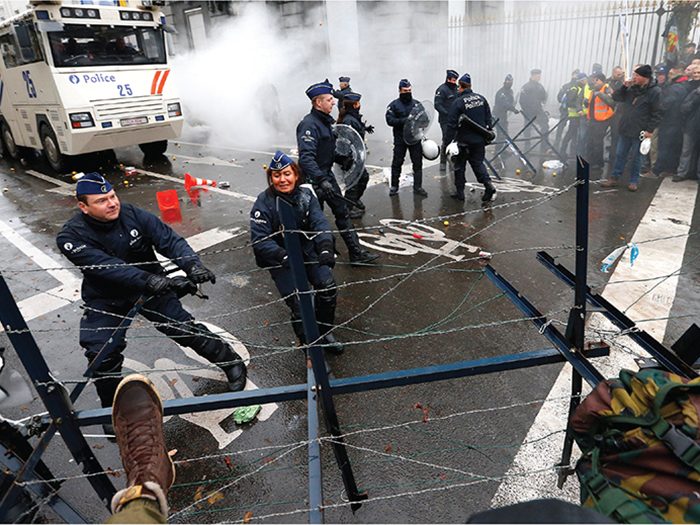Travel Risk
Duty of Care in a Perilous Age

Political risk and terrorism are on the rise, and so is the responsibility of all companies and organizations to make sure that their most treasured asset, their employees, are safe when they travel.
Risk consultants and insurers warn that now more than ever employers must make their best efforts to guarantee the physical and mental integrity of staff members and their dependents in foreign jurisdictions. Failing to do so can result in litigation in the U.S. and other countries alike, not to mention the potential of harm to valuable human resources.
U.S. safety and workers’ comp laws do not explicitly impose obligations on companies to guarantee the safety of employees sent abroad. Nonetheless, courts typically acknowledge duty of care obligations, resulting in high compensation for stakeholders that suffer harm while working abroad.
“OSHA has guidance for traveling employees, but the regulatory environment stops at the borders of the U.S.,” said Hart S. Brown, vice president of organizational resilience at Hub International. “Even then, companies are exposed to significant liabilities when their employees are traveling abroad for work.”
The lack of specific legislation about the issue could actually make it more likely that litigation will take place, according to law office Fisher Phillips. In a recent report published by International SOS, the firm noted that, if an employee suffers some kind of injury abroad, he or she is left with little alternative but to pursue legal redress by alleging that the company was negligent towards its duty of care obligations.
Brown said researchers have found that four out of every five business travelers believe their companies are responsible for protecting them throughout their travels, and a large share of them would consider suing if an adverse event occurred.
Once the decision to litigate is made, employees and their lawyers can shop around to find the most favorable jurisdiction for their cases. Countries such as the United Kingdom and France have implemented strict duty of care legislation that can apply to international travel, and lawsuits can be initiated there if companies have a presence in those places, even if the incidents happened elsewhere.
In the case of litigation, penalties can be significant. In 2015, the U.S. Court of Appeals decided that a Connecticut boarding school failed its obligations when it took students to China in 2007 and a 15-year-old contracted bone encephalitis after being bitten by ticks. The court ruled that the school should pay damages of $41.5 million, $10 million of which was paid to the student’s family.
Identify Foreseeable Risks
To avoid such situations, companies have been urged to invest in programs that address the identification of risks, the adoption of prevention measures and the training of employees before sending them abroad. The key is to make sure that foreseeable risks are identified and properly dealt with.
“Every company is involved in different kinds of work and in different locations, so their foreseeable risks will depend on their own environment and the destination of their mobile workforce,” said Robert Quigley, a duty of care expert at International SOS. “But many companies do not act on their duty of care to the extent that they should, hoping that nothing will ever happen.”
This approach sounds misguided, especially considering the problems that employees can face away from home. They range from natural catastrophes to political violence and terrorism to accidents during leisure time and illness. Stress and depression are also concerns.
Some of the biggest threats, though, aren’t what you might expect.
“Motor vehicles are in fact the number one cause of death among aid workers,” said Lynne Cripe, director of resilience services at KonTerra, a consultancy that advises NGOs who send staff to extremely risky locations.
Another concern involves employees being jailed for breaking laws they aren’t aware of. In January, for example, a South African expat and his Ukrainian fiancée were arrested in the United Arab Emirates for having sex out of wedlock.
Laurie Sherwood, a travel industry attorney at Walsworth, said that the employer and its partners involved in the organization of a trip are expected to disclose to travelers as much as possible about the risks they’re likely to face. Therefore, a thorough assessment must be performed for all stages of a trip in order to identify all foreseeable risks.
“There is no duty to warn of unforeseeable risks,” she pointed out. “On the other end of the spectrum, there is generally no legal duty to warn of obvious risks.”
Once risks are identified and shared with employees, companies must work towards training potential travelers and implementing systems that can help them before, during and after the trip, said Kevin Pedone, a vice president at Clements Worldwide. Pedone said specialized insurers like Clements offer online information platforms, pre-trip training and other tools to help travelers prepare themselves for the risks ahead.
In the event of an incident, these insurers have access to teams with expertise in evacuation services, medical support or kidnapping negotiations. “Companies do not want their HR staff negotiating with kidnappers,” he said.
“Many companies do not act on their duty of care to the extent that they should, hoping that nothing will ever happen.” — Robert Quigley, duty of care expert, International SOS
Once impacted employees return to the U.S., insurance can cover psychological evaluation, medical treatment, rehabilitation and even time off to help with the healing process.
Policies can also cover litigation costs, and if the organization is found negligent, any financial compensation up to the limits of the policy.
Document for Transparency
Every facet of an employers’ program for protecting the health and well-being of their traveling employees must be well documented, said Brown. It is vital, for instance, that the accountability chain in the case of an incident during an international trip is clearly specified. Individuals to whom the incident must be escalated have to be identified by title or by name, he recommended.
In a recent report, International SOS pointed out that decision makers with duty of care responsibilities in multinational companies include managing directors, general secretaries, corporate security and risk managers, travel managers, medical directors, insurance managers, legal managers, heads of HR, global HR practitioners responsible for international assignees and employees responsible for managing the work of international assignees.
It’s not hard to see how communication can get broken with so many people involved, and why clarifying the role played by each one is an important task.
“If the company had policies and procedures in place, and the person followed them, then the company will probably be ok from a liability lawsuit point of view,” Quigley said. Doing things right can go a long way toward avoiding the publicity and uncertainty of a court case.
“Most of these cases don’t reach the courts, as they are mostly settled outside,” Quigley concluded. &











